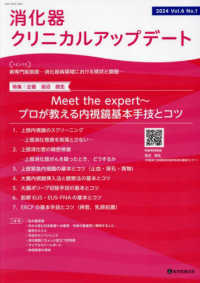- ホーム
- > 洋書
- > 英文書
- > Cinema / Film
Full Description
In the mid-1980s, film director Marco Bellocchio and renegade psychoanalyst Massimo Fagioli cowrote The Devil in the Flesh, a politically and sexually charged film illustrating some of Fagioli's controversial theories. Echoing the anti-Lacanian sentiment popularized by Gilles Deleuze, the film is perhaps best remembered for a scene in which the character Andrea misreads a section of the famous Greek tragedy Antigone. But this scene has itself been frequently misread, opening up the text to questions of feminism, politics, and the representation of Antigone—a figure frequently used and abused in feminist politics. Displaying considerable analytic depth, Misreading Postmodern Antigone considers these divergent readings and what they have to tell us about contemporary society.
Contents
Introduction
A Descriptive Analysis of the Text
Patriarchy against Matriarchy?
Antigone's Daughter and Haemon's Son Invade the Red Brigades
The Framing of the French Letter: The Other Unseen/Scene Film
Bellocchio's Anti-Tragedy as Seen/Scene Through Antigones Frames
The Hysteric's Discourse: The Undutiful Daughter
Leaving the Text: A Shock to Thought
Into the Image: From Hysteria to the Schizo Secret







